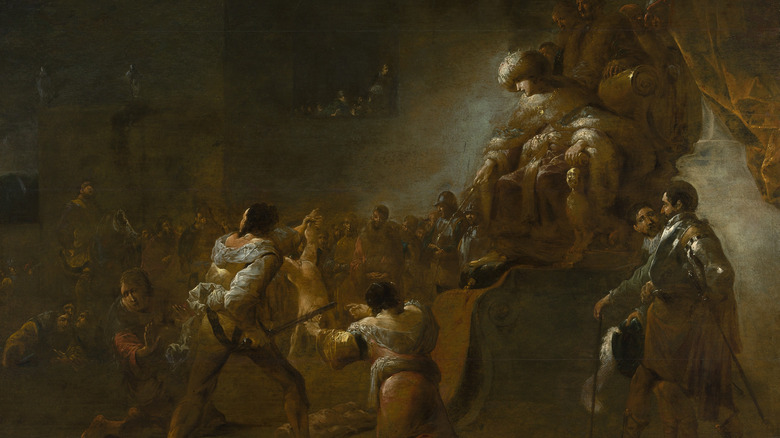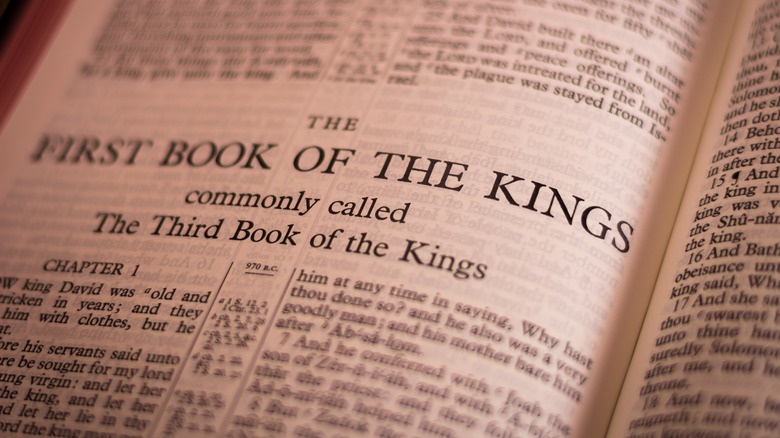Why Did King Solomon In The Bible Lose Favor With God?
King Solomon, revered as a prophet by the three Abrahamic faiths — Judaism, Christianity, and Islam — is renowned for many things, but he is above all considered wise. In 1 Kings 3 Solomon, having succeeded his father David as ruler of Israel, offers 1,000 burnt offerings to God, who then declares, "Ask for whatever you want me to give you." Solomon replies, "Give your servant a discerning heart to govern your people and to distinguish between right and wrong." Pleased at his humility, God grants Solomon wisdom, promising there would never be another man like him, and offers that which a lesser king would have requested, riches and glory. A famous story of Solomon's later wisdom sees him telling two women who both claim parentage of a child that the only solution is to carve the child in half; the woman who retracts her claim, to spare the child's life, is determined to be the true mother.
In the Islamic tradition, Solomon displays wisdom in his youth when two men come before King David. One man owned a vineyard and sought compensation after the other man's sheep had broken in and devoured the grapes. Young Solomon proposed the owner of the sheep care for the vineyard to restore it while the winemaker cared for the sheep and received its milk and wool (via Alim). David proudly calls his son "Solomon the Wise." Wise as a child and made more so by God as a young man, Solomon's missteps in his later years seem all the more surprising.
King Solomon betrays the Lord
In the stories of his life, Solomon is not made out to be a perfect man — despite his closeness to God, he is repeatedly distracted. In the Quran Surah 38:30-40, Solomon's love of horses diverts his attention from God (via Alim). His forgetfulness, failing to say "Allah willing" when praying for sons who will serve the Lord, brings a punishment of a stillborn child upon him and forces him to seek forgiveness (via Quran).
But what truly makes Solomon lose God's blessing, in the Judeo-Christian tradition at least, is when he takes wives from other nations (and, importantly, other faiths) and begins to worship different gods, direct violations of God's commandments. In 1 Kings 11, it is revealed Solomon has 1,000 wives (other sources, such as Jewish Women's Archive, instead depict Solomon has having 700 wives and 300 concubines), whose influence turns him, in his old age, toward the deities of the Ammonites, Sidonians, and the Kingdom of Moab. The man who built the Temple of the Lord in Jerusalem in 1 Kings 6 builds a place to worship the deities Chemosh and Molech east of the city! Such a betrayal could not pass without consequence.
God's retribution against King Solomon
1 Kings 11:9-40 sees God stirring with wrath. "Because this is your attitude and you have no respect for my promises or my laws that I commanded you to keep," God tells Solomon, "I will certainly tear the kingdom away from you. I will give it to one of your servants." It is only due to God's love of Solomon's father David that these events will occur after Solomon is gone. Only one tribe will be given to Solomon's descendants, again "for my servant David's sake" — the rest of the kingdom will fall to other families. It is clear that God has lost all respect for Solomon himself.
God then sets up rivals to Solomon, making Edomite and Damascus rulers more powerful and prosperous. One of Solomon's officers, Jeroboam, rebels against him, and though Jeroboam is forced to flee, God promises that once Solomon dies the Kingdom of Israel will be his. With the enemies that David had subdued once again strong, and the future king awaiting his turn in exile in Egypt, Solomon dies disgraced, and without forgiveness.


